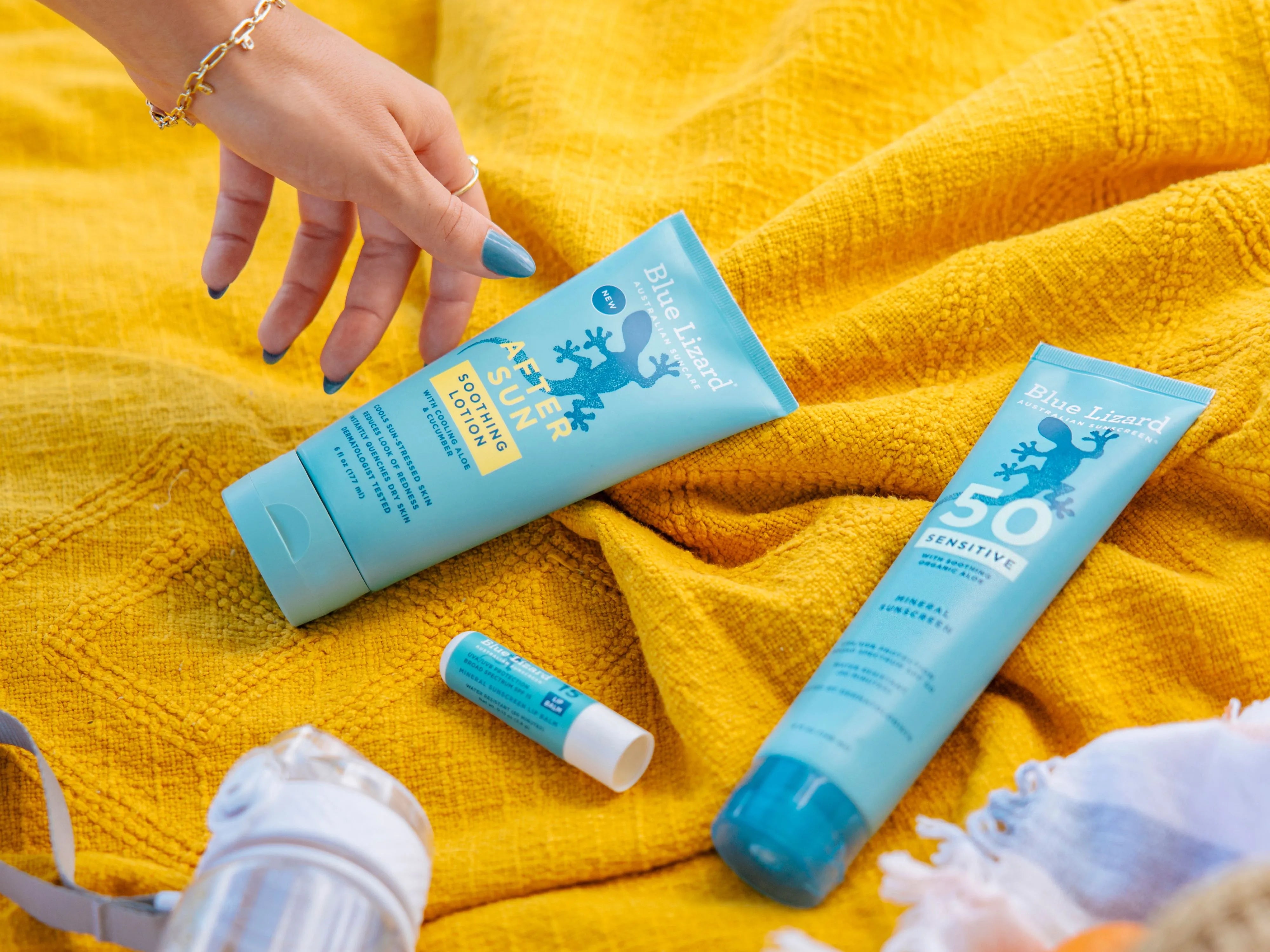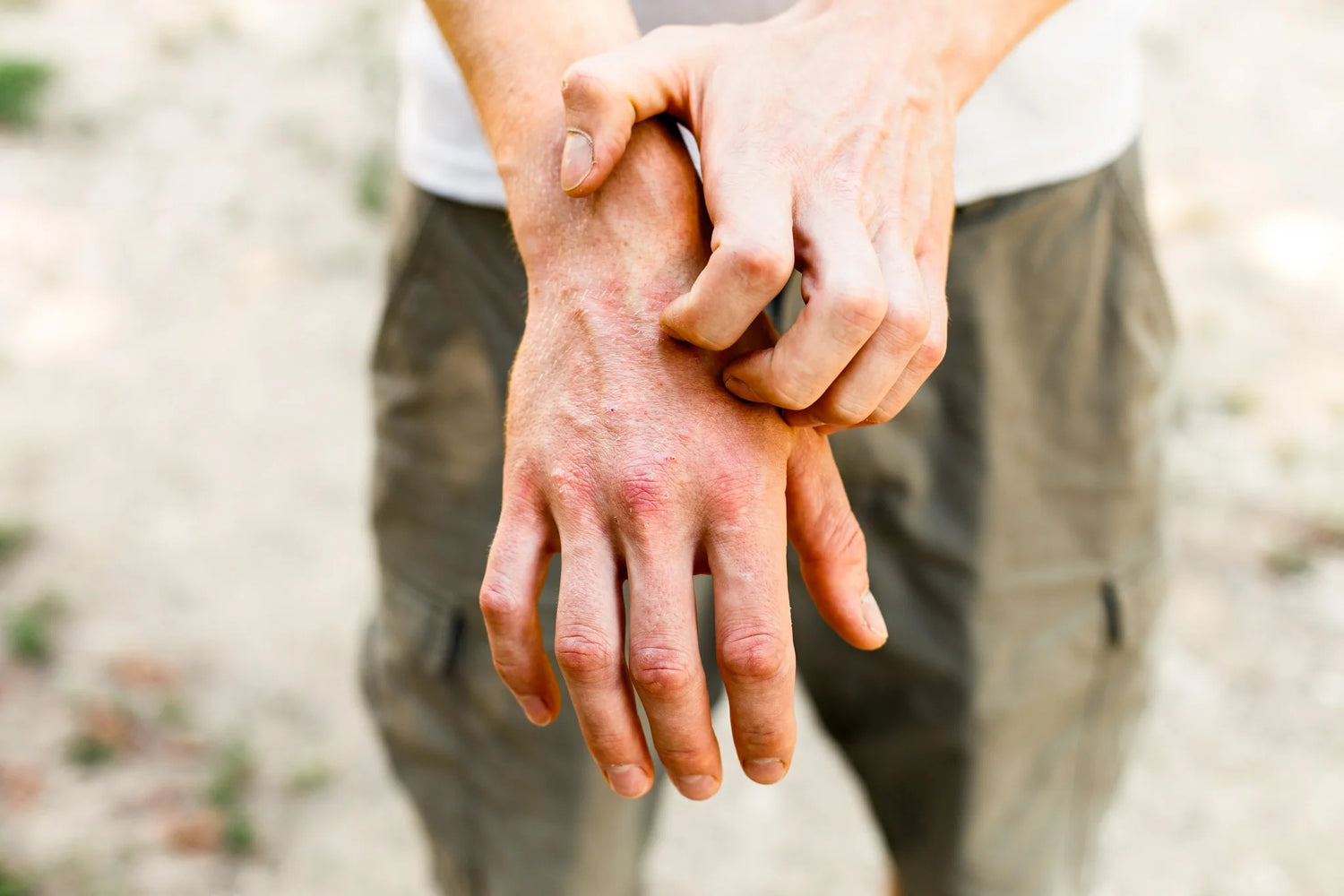October is National Eczema Awareness Month! Eczema is a general term for a set of chronic skin conditions. The most common type of eczema is atopic dermatitis. Red, irritated skin that itches and comes off in flakes are the most common symptoms, but some experience blisters and cracked skin.
What does eczema look like?
The tell-tale signs of an eczema flare-up are patches of red, dry, itchy skin on your hands, arms, neck or face. But symptoms vary from person to person.

The biggest determining factor is age. For example, infants are usually affected by dry patches on the cheeks and nose. For children ages 5 and up, eczema affects areas of the body that have folds or creases—think inner elbows and knees.
The most common eczema symptoms are:
- Itching
- Rough or scaly patches
- Thickening skin
- Blisters than may ooze or scab
Eczema is less common in adults than children, but more adults are developing eczema now than ever before. The AAD warns that, unlike children, adults with eczema often develop patches of thick skin around the eyes accompanied by intense itching.
Adults are also more likely to experience patches of scaly skin on the hands and arms.
There are many different types of eczema
Atopic dermatitis is the type of eczema most of us are familiar with. It is characterized by flare-ups of red, dry skin that can come off in flakes. Atopic dermatitis flare-ups tend to worsen during the winter months when the cold, dry air sucks the moisture from your skin.
Contact dermatitis is another common form of eczema. The condition is triggered when our skin comes in contact with an allergen or irritant. Common triggers include: poison ivy and poison oak, nickel, latex, acid and prolonged water exposure.
Because the triggers of contact dermatitis are so broad, nearly everyone gets this type of eczema at least once.
Dyshidrotic eczema usually only affects adults between the ages of 20 and 40 and normally appears as small blisters on the hands and feet. You are at a higher risk of developing this condition if you already have atopic or contact dermatitis.
Dyshidrotic eczema is commonly caused by excess moisture and rising temperatures (the opposite of atopic dermatitis). For this reason, you’re more likely to develop this type of eczema if you frequently immerse your hands in water at work, like healthcare workers, hair stylists and cooks.
Other forms of eczema include nummular dermatitis, neurodermatitis and stasis dermatitis. These forms of eczema also cause patches of red, itchy skin, but are less common than other forms of eczema.
What causes eczema?
Eczema is thought to be caused by an overactive immune system reaction, but the truth is that there is no known cause of eczema.
Studies have shown that a person’s environment could affect their risk—those in developed countries, living in cities with higher levels of pollution, or living in a cold climate are more likely to develop eczema.
There’s also evidence that genetics play a role. The AAD says that children are more likely to get eczema if one or both parents have it.
The good news is that eczema isn’t contagious, so there is no chance that you can catch it or give it to someone else.
Treating eczema flare-ups at home
While there is no cure for eczema, flare-ups can be managed and prevented with over the counter treatments and prescription medication.

Dry skin is prone to eczema flare-ups, so keeping your skin hydrated is a must. Using a moisturizer, especially when it gets cold outside, is a simple way to keep flare-ups to a minimum.
If you are prone to contact dermatitis, avoiding known or possible triggers could be the best option. Keep a diary of when you develop eczema, watching for patterns in your activities and subsequent breakouts.
When in the midst of a flare-up, over-the-counter anti-itch lotions like Sarna Sensitive can soothe the inflammation and help reduce itching.
If your eczema worsens to the point that your skin cracks and/or oozes, you are at risk of developing an infection. You can prevent infection by keeping the affected area as clean as possible.
For severe eczema, prescriptions are available from your dermatologist in the form of steroid-free ointments and injections that help calm the immune system’s reaction to irritants.
Staying Sun Safe When You Have Eczema
Wearing sunscreen is a must, especially if you have eczema. Eczema-prone skin is more sensitive to the sun’s rays than most, but the active ingredients in chemical sunscreens, namely Oxybenzone, can irritate your skin and make your condition worse.
The National Eczema Association suggests using a mineral or mineral-based sunscreen with an SPF of 30 or greater. The active ingredients in mineral sunscreens—Zinc Oxide and Titanium Dioxide—are gentler on sensitive skin and less likely to set off an eczema flare-up.
Our “We Love the Reef” line of mineral and mineral-based sunscreens are made without the use of Oxybenzone, making them a great choice if you have eczema-prone skin.
For more tips on how to avoid dry skin, check out our Fall Skincare guide here.








